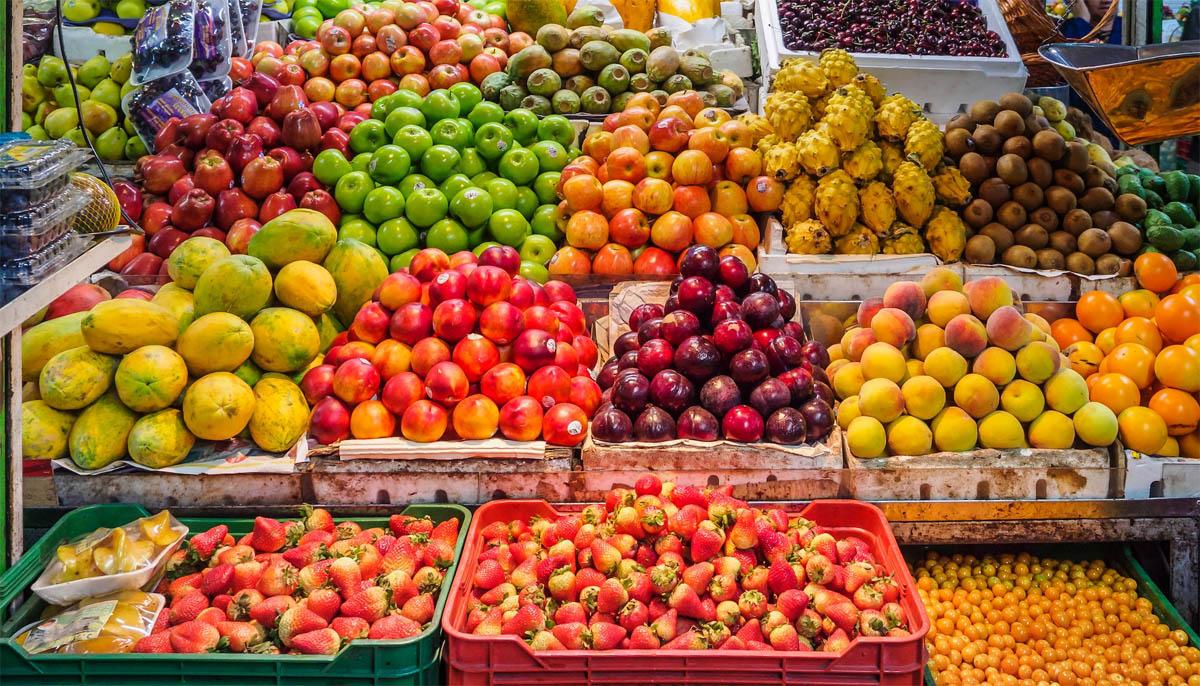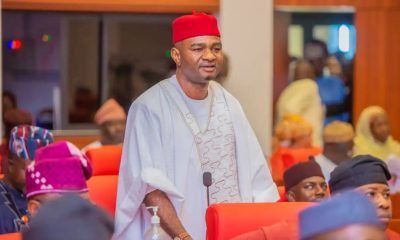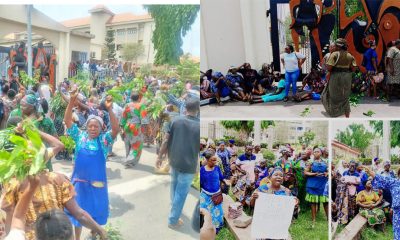Business
Protest: Prices of perishable food items crash in Lagos

Protest: Prices of perishable food items crash in Lagos
Some perishable food prices have crashed by about 50 per cent as a result of the ongoing nationwide hunger protest, the News Agency of Nigeria (NAN) reports.
The #EndBadGovernanceinNigeria protest, which stated on Thursday, is planned to end on August 10.
It is aimed at calling the Federal Government’s attention to the economic hardship facing Nigerians.
Some traders and buyers at Ile-epo food market at Alimosho/Agege area of Lagos State, confirmed the development in separate interviews with NAN.
NAN also reports that local food markets across the area witnessed less patronage.
A tomato trader at Ile-Epo market, Agege area, Mr Rabiu Aliu, said the price of some perishable food items ranging from tomatoes to chilli pepper and others dropped to minimise loss due to low patronage caused by the protest.
“A 50kg basket of tomatoes now sells for between N40,000 and N50,000 as against N80,000 to N100,000 two weeks ago.
“A 25kg basket sells between N18,000 and N19,000 as against N30,000 to N40,000 two weeks ago.
“We have no choice but to sell off because few customers are available to buy the produce. The purchasing power is actually low at the moment,” Aliu said.
Also speaking, another trader, Mrs Mukit Afolabi, said that the price of perishable items had dropped in the market as a result of the hunger protest.
“On Day 1 of the protest, tomatoes were even cheaper because there was no one to buy.
“I bought a 5kg basket of tomatoes at N4,000. As of two weeks ago, it sold for N12,000. So, I think the protest is contributing to the drop in price.
READ ALSO:
- Dangote refinery set for global oil market, receives US crude shipments
- Woman faints as police disperse protesters in Abuja
- S’African Rupert dethrones Dangote as Africa’s richest man
“However, rodo (scotch bonnet pepper) is still expensive. On Monday, a bag was sold for N40,000 but today, a bag sells at N84,000 because it is currently unavailable in the market.
“No produce truck has delivered any pepper since Wednesday, the day before the protest began,” Afolabi said.
A foodstuff trader, Mr Ibrahim Ahmed, also affirmed a drop in the price of rice and beans.
“A 50kg bag of short grain rice now sells for N73,000 as against N83,000 last month. While the long grain sells for N78,000 per 50 kg bag as against N87,000 to N88,000.
“A paint bucket of honey beans now sells for N10,000 as against N12,000 it was sold in July.
Other varieties now sell for between N8,000 and N9,000,” he said.
NAN reports that other items such as groundnut oil and palm oil recorded tremendous increase in price.
Mrs Hope Osagie, a trader of the produce at the Agege Market, said that the price of the produce had increased in the last couple of days.
“A 25 litre of groundnut oil now sells at N60,000 as against N38,000 that was sold a month ago.
“While a 25 litre of palm oil now sells for N36,000 as against N27,000 in July.
“We really do not know the reason for the hike but generally food stuff prices have been rather unpredictable,” Osagie said.
However, a buyer, Mrs Anuoluwa Olayinka, expressed excitement over the drop in the price of tomatoes and other perishable items.
“I bought as much as I could afford as I saw the price had dropped.
“Well, there are just few people in the market, which is quite unusual for a Friday. So, I guess traders just want to sell off to minimise loss,” Olayinka said.
Another buyer, Mrs Ada Uzor, said that “foodstuff prices are unpredictable but I think the protest contributed to the slight price drop of some items.”
(NAN)
Auto
CFAO subsidiary LOXEA unveils BYD electric vehicles in Nigeria

CFAO subsidiary LOXEA unveils BYD electric vehicles in Nigeria

A subsidiary of CFAO Mobility, LOXEA Nigeria, has introduced the BYD brand of electric vehicles to the Nigerian market.
LOXEA has thus become the pioneer in bringing the renowned electric vehicles (EVs) manufactured by BYD (Build Your Dreams) into the country.
BYD is a high-tech multinational company and the world leader in electric and plug-in hybrid vehicles.
“As a Fortune Global 500 enterprise, BYD relentlessly innovates to create a sustainable future,” said the automaker.
“In November 2024, BYD becomes the first company in the world to achieve the milestone with the roll-off of its 10-millionth NEV.
“BYD achieves 4.27 million new energy vehicle sales in 2024, claiming the global sales champion in the third consecutive year.”
Managing Director of LOXEA Nigeria, Mr. Mehdi Slimani, stated, “We are proud to distribute this type of electric vehicle and all its associated services.
“Our upcoming showroom in Victoria Island, Lagos will be a place dedicated to the discovery of BYD vehicles, combining modernity, comfort, and economy of use. “It is very important for CFAO Mobility in Nigeria to participate in this way in the country’s energy transition and support our customers who wish to make the switch to electric.”
Chief Executive Officer of CFAO Mobility, Marc Hirschfeld, spoke on the importance of this launch for both the company and the country, saying, “BYD is one of the world’s leading manufacturers of electric vehicles, with a level of innovation know-how that now matches the expectations of our markets in Africa.
“A whole new ecosystem has to be designed around mobility in African cities.
“This applies not only to individual and corporate customers, but also to stakeholders including urban public transport networks and government agencies.
LOXEA specialises in providing innovative mobility solutions across Africa.
With a commitment to sustainability and excellence, it delivers high-quality mobility services, from electric vehicle leasing to fleet management and infrastructure support.
LOXEA is a leading player in innovative mobility solutions in Africa, offering clients a range of 100% electric vehicles from BYD.
As a pioneer in the deployment of electric vehicle solutions across the continent, LOXEA is bringing to Nigeria a comprehensive suite of services associated with electric vehicles.
This includes the installation of electric charging stations, vehicle maintenance, repair services, and the provision of spare parts.
In addition to providing an inaugural charging station at the upcoming LOXEA Victoria Island showroom, the company is also offering an adaptable solution that allows customers to charge their EVs conveniently at home.
The company says more information on this can be obtained from its website: https://www.byd-nigeria.com/ .
Business
Petrol price rises to N935 in Lagos

Petrol price rises to N935 in Lagos
Petrol marketers across the Lagos metropolis at the weekend raised the pump price of the commodity to between N925 per litre and N935 per litre.
This is in response to the increase in the landing cost of petrol, the stoppage by Dangote Refinery of the sales of the commodity in naira about two weeks ago and the delay in conclusion of negotiation on the naira for crude policy.
Last Monday, the landing cost of the commodity rose to N843.28 per litre from a previous N797 per litre a forthnight ago.
This increase represents an addition of N46 per litre to the landing cost of petrol.
Some filling stations like TotalEnergies sold at N935 per litre; MRS, N925.
ARA is a crucial global oil and biofuel hub known for its physical infrastructure, pricing benchmarks, and significant oil consumption.
It added that seasonal refinery maintenance across Europe and a recent fire at the Falconara refinery in Italy have further restricted supply, adding to market tightness and price volatility.
The Association said the foreign exchange rate remained fairly stable, with minimal fluctuations observed over recent periods.
Therefore, the landing cost of petrol, being fundamentally influenced by these elements, is likely to change several times intra-day.
It advised that savings can be achieved through negotiations, access to foreign exchange, and logistics efficiencies, for example, by eliminating Ship to ship (STS) transfer where possible or receiving larger cargos.
MEMAN explained that the landing cost into Apapa/ASPM Jetty is calculated based on the following assumptions: exchange rate, finance charges at 32 per cent per annum for 30 days; STS and related charges; NIMASA charges at two per cent of local STS; NMDPRA at 0.5 per cent MDGIF; NPA and VAT charges covering towage, berthage/mooring, ship dues, cargo dues, contingency, fire coverage, agency fee; other costs at N2 per litre.
Petrol price rises to N935 in Lagos
Business
Dangote Refinery: MRS, other filling stations increase petrol price
Dangote Refinery: MRS, other filling stations increase petrol price
The price of petrol has surged to N930 per litre in Lagos and N960 in northern states, following the recent suspension of naira payments for crude oil by the Dangote refinery.
MRS filling stations implemented the new pricing structure on March 28, 2025, marking a N70 increase from the previous rate of N860 in Lagos and N80 higher than the former N880 in the North.
Other fuel retailers have also adjusted their prices, with NIPCO reportedly selling at N930 per litre in Magboro, Ogun State, on Saturday.
According to MRS Oil & Gas, trucks will load products from its Lagos depot and distribute them across the country at varying costs.
The company’s latest pricing document confirms that Lagos has the lowest fuel rate, while northern states face the highest prices. However, the company did not specify whether it sourced its supply from the Dangote refinery.
Under the revised price framework, petrol now costs N930 per litre in Lagos, N940 in other South-West states, and N960 in the South-South and South-East regions, including Edo, Abia, Akwa Ibom, Bayelsa, Rivers, Cross River, and Enugu.
READ ALSO:
- Ex-Rivers HoS wife cries for help over husband’s safety
- Fubara reacts as Ex-HOS, Nwaeke accuses him of bombing oil pipelines, Rivers Assembly
- Natasha: Emmanuel Uduaghan threatens to sue Senator Nwaebonyi
In the North, Abuja, Kaduna, Benue, Kogi, Niger, Sokoto, Kebbi, and Nasarawa will pay N950 per litre, while Zamfara, Kano, Jos, Bauchi, Taraba, Adamawa, Borno, Katsina, Jigawa, Gombe, and Yobe will pay N960.
The Free Carrier Agreement (FCA) price, which determines how much marketers pay before reselling fuel, also differs by region. Lagos has the lowest FCA price at N905 per litre, whereas states like Borno, Taraba, Adamawa, and Yobe have FCA prices around N888 per litre.
The recent suspension of the naira-for-crude initiative by the Dangote refinery was attributed to discrepancies in crude oil allocation. Sources indicate that the Nigerian National Petroleum Company Limited (NNPCL) allocated large volumes of crude to foreign creditors to settle outstanding loans, making it difficult to sustain local transactions in naira.
As a result, independent fuel importers have taken advantage of the situation, increasing depot prices. Industry analysts warn that the rising petrol costs could drive up transportation fares and the prices of goods and services.
Experts suggest that prices may stabilize once the Dangote refinery secures a reliable crude oil supply from NNPCL and resumes selling in naira. Until then, consumers across the country will have to contend with higher fuel costs.
Dangote Refinery: MRS, other filling stations increase petrol price
(PUNCH)
-

 Uncategorized2 days ago
Uncategorized2 days agoBreaking: Moon sighted in Saudi, UAE, others, Eid-Fitr holds Sunday
-

 metro2 days ago
metro2 days agoRamadan ends in Nigeria, Sultan announces March 30 as Eid-el-Fitr
-

 metro3 days ago
metro3 days agoFubara reacts as Ex-HOS, Nwaeke accuses him of bombing oil pipelines, Rivers Assembly
-

 Opinion3 days ago
Opinion3 days agoBarbaric mass burning of innocents in Edo, by Farooq Kperogi
-

 metro2 days ago
metro2 days agoEmbrace environmental sanitation during Eid-Fitr, LAGESC boss tells Lagosians
-

 metro3 days ago
metro3 days agoEx-Rivers HoS wife cries for help over husband’s safety
-

 International16 hours ago
International16 hours agoIn pictures: Eid celebrations around the world
-

 metro3 days ago
metro3 days agoNatasha: Emmanuel Uduaghan threatens to sue Senator Nwaebonyi













